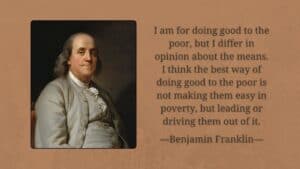I am for doing good to the poor, but I differ in opinion about the means. I think the best way of doing good to the poor is not making them easy in poverty, but leading or driving them out of it.
—Benjamin Franklin—

Quote #8
next…
Background:
In an article published by the Heritage Foundation titled “Poverty and Welfare in the American Founding,” Thomas West writes,
When Benjamin Franklin lived in England in the 1760s, he observed that the poverty problem was much worse in that country than in America. Britain did not limit its support of the poor to a safety net provided under conditions that prevented abuse. There, the poor were given enough that they could live in idleness. The result was to increase poverty by giving the poor a powerful incentive not to become self-supporting. Franklin wrote:
I am for doing good to the poor, but I differ in opinion of the means. I think the best way of doing good to the poor, is not making them easy in poverty, but leading or driving them out of it. In my youth I travelled much, and I observed in different countries, that the more public provisions were made for the poor, the less they provided for themselves, and of course became poorer. And, on the contrary, the less was done for them, the more they did for themselves, and became richer. There is no country in the world where so many provisions are established for them [as in England] … with a solemn general law made by the rich to subject their estates to a heavy tax for the support of the poor…. [Yet] there is no country in the world in which the poor are more idle, dissolute, drunken, and insolent. The day you [Englishmen] passed that act, you took away from before their eyes the greatest of all inducements to industry, frugality, and sobriety, by giving them a dependence on somewhat else than a careful accumulation during youth and health, for support in age and sickness. In short, you offered a premium for the encouragement of idleness, and you should not now wonder that it has had its effect in the increase of poverty. [Benjamin Franklin, “On the Price of Corn, and Management of the Poor,” London Chronicle, November 1766, in Writings, ed. J. A. Leo Lemay (New York: Library of America, 1987), pp. 587–588.]
West continues,
We see in Franklin’s diagnosis a striking anticipation of today’s welfare state, in which, as we will see, poverty has remained stagnant as the welfare system has swelled since the 1960s. Franklin’s understanding of the welfare paradox—that aid to the poor must be managed carefully lest it promote indolence and therefore poverty—was shared by most Americans who wrote about and administered poverty programs until the end of the 19th century.
Graphic copyright © 2021 by B. Nathaniel Sullivan. All rights reserved.